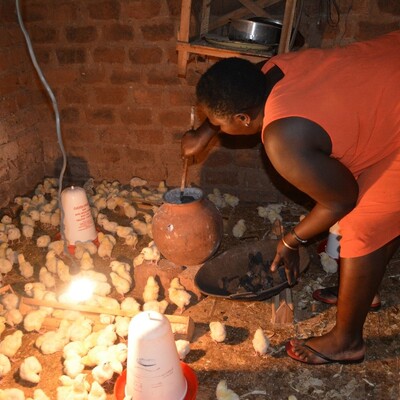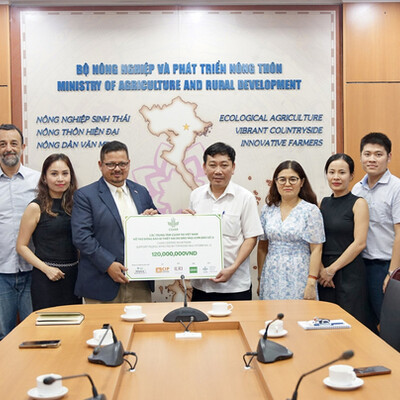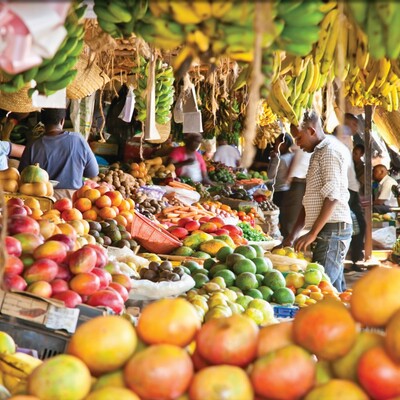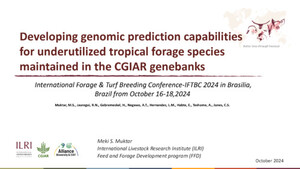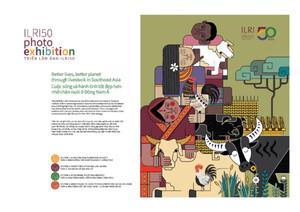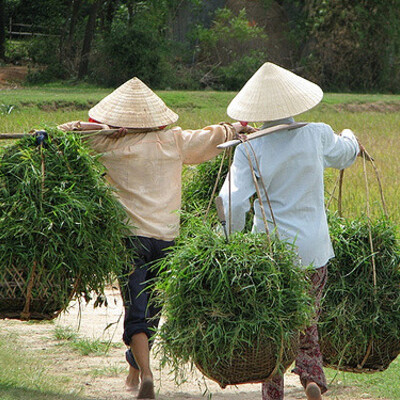
ILRI marks International Women's Day 2021 by reflecting on the impact of COVID-19 on women leaders

A woman milks one of her goats in Ségou District, Mali (photo credit: ILRI/Valentin Bognan Koné).
In low- and middle-income countries women form the largest proportion of the poor livestock farming workforce, constitute less than 19% of the agricultural holders, and receive 5% of all agricultural extension services and 10% of total agricultural development funds. Yet, women allocate more than 70% of their income to household needs, mainly to ensure household food and nutrition security and general well being. Livestock are one of the few farm resources women can own and control. Livestock provide nutritious food daily, that women in their social role as nutrition providers, can use to feed themselves and their families. The sale of animal source foods can provide cash for household expenses in areas where alternative opportunities for income may be rare.
However, despite the livestock sector being a viable contributor to women’s source of income and livelihood, women face many challenges that hinder their ability to produce and benefit maximally from the sector. In developing nations, women have limited access to productive resources, information and even markets. These barriers are persistently maintained through social norms, which deter women from participating in decision making, owning resources, and traveling to reach markets or extension services. The COVID-19 pandemic has escalated gender-based constraints: it has compounded further the challenges women face owing to movement restrictions that made it impossible for women to buy livestock inputs and sell their produce. Women have sold the livestock species they controlled at a higher rate than men, to deal with the COVID-19 emergency. Under COVID-19 women have had to deal with increasing care for the sick, childcare burdens, and domestic violence among others.
This year’s International Women’s Day theme is ”Women in leadership: Achieving an equal future in a COVID-19 world.” It is aimed at celebrating the tremendous efforts by women and girls around the world in shaping a more equal future and recovery from the COVID-19 pandemic. Women have played crucial roles in the front lines of the COVID-19 crisis, as health care workers, caregivers, innovators, community organizers and as some of the most exemplary and effective national leaders in combating the pandemic. They have continually demonstrated their skills, knowledge and systems to effectively lead in response and recovery efforts.
At ILRI, we sought to mark the day by reflecting on the impact that the COVID-19 pandemic has had on women and the leadership strategies they are implementing to manage the situation. We interviewed some of our leaders at ILRI to highlight gender research at the Institute and the One-CGIAR platform. Iain Wright, the Deputy Director General at ILRI and also Chair of the CGIAR GENDER Platform Interim Management Committee notes that ILRI continually provides and also seeks to avail further opportunities for women advancement not only at career level, but in all aspects of their lives. He adds that the One CGIAR platform offers additional opportunities and encouraged staff to seek out advise or mentorship from women leaders who have attained what they aspire to attain in life.
We also spoke to Alessandra Galiè, the ILRI’s Gender Team Leader – one of the few women who took up leadership positions at the height of the COVID-19 pandemic. Alessandra has a great vision to steer the ILRI gender team forward. She notes that the team needs to take stock of the available information on gender and livestock, to identify knowledge gaps and develop a research agenda that addresses these gaps. In regard to the COVID-19 pandemic, Alessandra says it’s also important for scientists within the One CGIAR to harness synergies across the various agricultural commodities and systems to address gender issues more comprehensively and effectively.
Here is a link to the interview conducted with Alessandra Galiè, Team Leader: Gender, ILRI.
Nicoline de Haan is the Director of the CGIAR GENDER Platform, a role that she also took up during the COVID-19 crisis. We also spoke to Nicoline in a bid to find out what the GENDER platform is implementing, and she outlines the approach that the platform is leading in putting gender equality at the heart of food systems research. In regard to the COVID-19, Nicoline notes that the pandemic has not only highlighted the important role women play in society, but also availed lessons on the importance of including women in decision making.
We also spoke to women vendors involved in the ‘Women in Business’ (WiB) research project that aims to develop, promote, and test women-led chicken businesses with the goal of promoting the economic empowerment of young rural poor women and improving the food and nutrition security of their households. We captured the experiences of women chicken vendors under the COVID-19 pandemic situation and also to identify opportunities and avenues for WiB to support.
Elizabeth Swai, the Chief Executive Officer at AKM Gliters Company Limited based in Tanzania. Listen into to her story of resilience that runs up into the COVID-19 pandemic.
Tatu Ibrahimu, a unit brooder leader under AKM Glitters in Tanzania highlights her situation.
Grace Bruno Duncan, a chicken business entrepreneur in Tanzania narrates her experience further.
The situation is no different in Ethiopia. The COVID-19 pandemic has compounded the challenges women face in the livestock sector. We also spoke to some of the women taking part in the Women in Business Project in the nation to highlight the plight they have had to combat with during the pandemic. Visit the links below to access the videos.
Women in Business Ethiopia videos
We have all these and so much more on the ILRI International Women’s Day 2021. Click here to visit.
#IWD2021 #InternationalWomensDay @ILRI
See gender publications here …
See more from the CGIAR GENDER platform here …
Happy International Women’s Day 2021!







